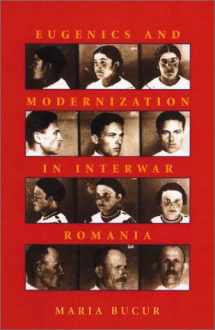
Eugenics and Modernization in Interwar Romania (Russian and East European Studies)
ISBN-13:
9780822941729
ISBN-10:
0822941724
Edition:
1
Author:
Maria Bucur
Publication date:
2001
Publisher:
University of Pittsburgh Press
Format:
Hardcover
304 pages
Category:
Romania
,
European History
FREE US shipping
Book details
ISBN-13:
9780822941729
ISBN-10:
0822941724
Edition:
1
Author:
Maria Bucur
Publication date:
2001
Publisher:
University of Pittsburgh Press
Format:
Hardcover
304 pages
Category:
Romania
,
European History
Summary
Eugenics and Modernization in Interwar Romania (Russian and East European Studies) (ISBN-13: 9780822941729 and ISBN-10: 0822941724), written by authors
Maria Bucur, was published by University of Pittsburgh Press in 2001.
With an overall rating of 4.3 stars, it's a notable title among other
Romania
(European History) books. You can easily purchase or rent Eugenics and Modernization in Interwar Romania (Russian and East European Studies) (Hardcover) from BooksRun,
along with many other new and used
Romania
books
and textbooks.
And, if you're looking to sell your copy, our current buyback offer is $0.07.
Description
Eugenics movements gained momentum throughout Eastern Europe between World Wars I and II. Maria Bucur demonstrates that the importance of the eugenics movement in Romania rests not so much in the contributions made to the study of science as in the realm of nationalist ideology and social policy making. The notion that the quality and quantity of the human species could and should be controlled manifested itself through social engineering projects ranging from reshaping gender roles and isolating ethnic undesirables to introducing broad public health measures and educational reform. Romanian eugenicists sought to control such modernization processes as urbanization and industrialization without curbing them, yet they also embraced attitudes more typically identified with anti-modernists in Romanian politics and culture. Bucur is the first historian to explore the role of eugenics as a response to the challenges of nation- and state-building in Eastern Europe. She presents a balanced assessment of the interwar eugenics movement’s success and failures and identifies connections and discontinuities between the movement and the post-war communist regime.


We would LOVE it if you could help us and other readers by reviewing the book
Book review

Congratulations! We have received your book review.
{user}
{createdAt}
by {truncated_author}


